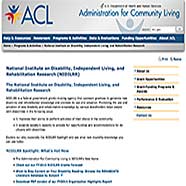KT at NIDILRR
NIDILRR is a federal government grants-making agency that sponsors grantees to generate new disability and rehabilitation knowledge and promote its use and adoption. Promoting the use and adoption of new disability and rehabilitation knowledge by various stakeholders helps people with disabilities in the following ways:
- It improves their ability to perform activities of their choice in the community
- It expands society's capacity to provide full opportunities and accommodations for its citizens with disabilities
"American Institutes for Research used in compliance with public domain status of U. S. Government publication."
Long Range Plan
NIDILRR’s 2018-2023 Long-Range Plan presents a five-year agenda that will advance applied disability, independent living, and rehabilitation research. NIDILRR intends for this plan to emphasize consumer relevance and scientific rigor, to present an agenda that is scientifically sound and accountable and, as a result, to contribute to the refinement of national policy affecting people with disabilities.
- ADA Network KT Center
The ADA Knowledge Translation Center (ADAKTC) functions as a platform for knowledge translation on topics related to the ADA. It does this by working to accomplish the following three goals:- Optimize efficiency and impact of the ADA National Network's (ADANN) activities,
- Increase awareness and use of ADA research findings to inform behavior, practices, or policies, and
- Improve understanding of ADA stakeholders' need for and receipt of ADA Network Services.
- Model Systems KT Center (MSKTC)
The Model Systems Knowledge Translation Center (MSKTC) summarizes research, identifies health information needs, and develops information resources to support the Model Systems programs in meeting the needs of individuals with traumatic brain injury (TBI), spinal cord injury (SCI), and burn injury. - The Center on Knowledge Translation for Employment Research (CeKTER)
The Center on Knowledge Translation for Employment Research or CeKTER (pronounced like “sector”) aims to promote the use of employment research findings & research-based products by people with disabilities, employers, employment service providers, vocational rehabilitation professionals, and policy makers among. CeKTER’s overall goal is assisting NIDILRR disability employment grantees with sharing their work that will improve services, approaches, practices, and policies that support improved outcomes of people with disabilities. - American Institutes for Research (AIR) Center on Knowledge Translation for Disability and Rehabilitation Research (KTDRR)
The Center on KTDRR promotes "the use of high-quality disability and rehabilitation research that is relevant to the needs of intended audiences by serving as the main KT resource" for National Institute on Disability, Independent Living, and Rehabilitation Research (NIDILRR) funded researchers, developers, and KT centers. Other Center stakeholders include people with disabilities and their families, disability advocates, service providers, and policy makers, as well as administrators, educators, and employers. - Initiative to Mobilize Partnerships for successful Assistive teChnology Transfer (IMPACT)
This project addresses the barriers, facilities, and factors associated with assistive technologies (ATs), and successful AT technology transfer (ATTT).
Contracts:
National Rehabilitation Information Center (NARIC)
The NARIC website is a gateway to an abundance of disability- and rehabilitation-oriented information organized in a variety of formats designed to make it easy for users to find and use. Since 1977, NARIC staff members have been dedicated to providing direct, personal, and high-quality information services to anyone throughout the country. As a leader in providing interactive information to the disability and rehabilitation community, NARIC's Web site continues this tradition by putting the information into the hands of the users through online publications, searchable databases, and timely reference and referral data.
- REHABDATA developed by NARIC
REHABDATA, produced by the National Rehabilitation Information Center, is the leading literature database on disability and rehabilitation. The database describes over 80,000 documents covering physical, mental, and psychiatric disabilities, independent living, vocational rehabilitation, special education, assistive technology, law, employment, and other issues as they relate to people with disabilities.
Review of Disability and Rehabilitation Research:
NIDILRR Grantmaking Processes and Products (2012)
The National Academies Press
Report by the National Research Council is an external evaluation of some of NIDILRR’s key processes and assessment of the quality of outputs produced by NIDILRR grantees.

